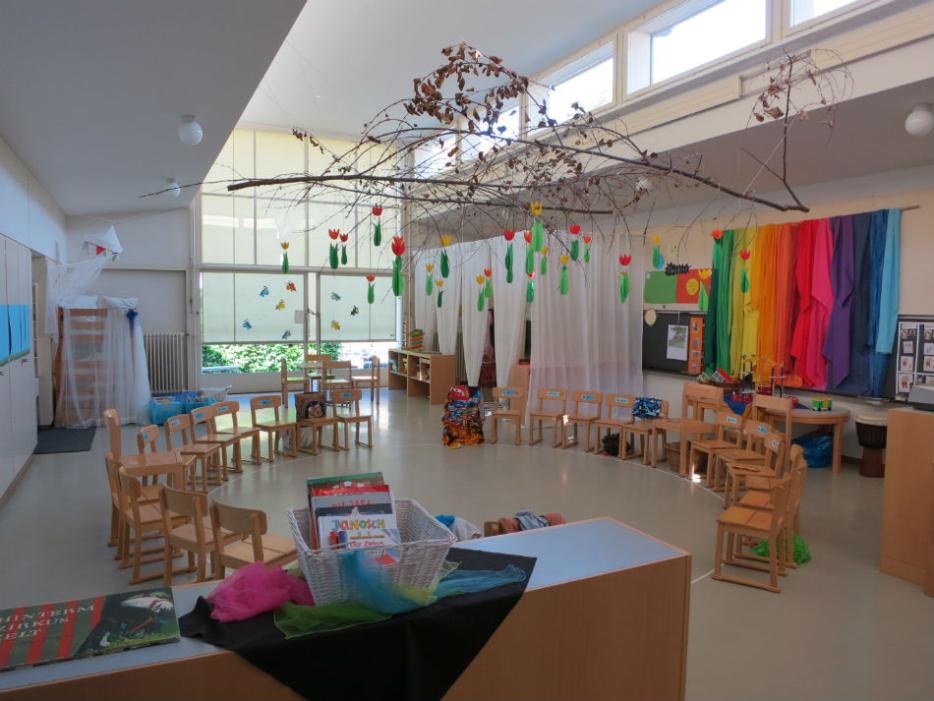The day Betsy DeVos was confirmed as Secretary of Education, a friend whose child is also on the spectrum texted me to say that, while absolutely everything had felt like a nightmare since November 8th, this was the defeat that had, so far, cut deepest. That night, I dreamed about shouting at my Trump-supporting relatives: “If they destroy special education in this country, you’ll never see my kid again.” (I would like to be able to tell you I am coping better now, but this has become a recurring nightmare.)
My younger daughter, who is in kindergarten, was diagnosed with autism a little over two years ago. I’m never sure how to write about this, or if I should even try at all. In our deeply ableist society, my experiences, feelings, and fears as a neurotypical parent are not the ones that need to be elevated. But it is also true that concern for our child is always there without me having to summon it, circling my mind in an unbroken loop—and, far more than anything I actually do write about with any regularity, the effort to meet her needs fills my thoughts, governs what I do and the things I commit to and how I approach each day.
There are plenty of victories to ponder, of course—positive reports from teachers and happy little moments from her day I hold close, talismans against the fear that sometimes keeps me awake. When I worry, I worry not so much because of who she is—a smart, funny, affectionate, delightful kid—but because of who we are, collectively, as a society. I worry that this world designed for neurotypical people won’t truly see or understand her. I worry because I have seen this happen, over and over, with strangers and teachers, among our friends, within our own families. If something requires just a little bit of extra work, the slightest shift in perspective, many won’t even attempt it. It is always easier to see, to work for, to care about only that which you can easily understand.
*
Often, my last conscious thought before I fall asleep at night is something to do with my daughter’s schooling—some area where I wish she had more support; some request I want to make of one of her teachers; or (worst of all) some regret over something I should have done to better advocate for her that day. There have been so many nights over the past few years when these thoughts have kept me from sleeping at all. Nowadays, when I can’t sleep for worrying about her and her education, sometimes it’s because I am thinking about Donald Trump and his cabinet.
Trump’s mocking of a disabled journalist and his vaccine scaremongering are now infamous, if also sometimes forgotten alongside so many other vicious rants and alarming positions. After he nominated Jeff Sessions for Attorney General, comments resurfaced from Sessions’s 2000 speech regarding the Individuals with Disabilities Education Act (IDEA) and its protections for disabled students, which he called “the single most irritating problem for teachers throughout America today.” According to our new Attorney General, IDEA helped fuel “the decline in civility and discipline in classrooms all over America.” The scapegoating of disabled children led the Autistic Self Advocacy Network to issue a statement condemning his nomination: “We have grave concerns that under Sessions, the Department of Justice would not protect the rights of disabled people and other marginalized populations.”
I am in the midst of a weeks long, meandering and often emotional conversation with my friend Emily Brooks, an autistic person and disability rights advocate whose work relates to educational support for children with disabilities. Emily and I began venting to one another about these issues over email around the time Sessions was nominated, and have since exchanged thousands of words about our fears for disabled children living under this administration. When Betsy DeVos suggested during her January 17 Senate confirmation hearing that the educational rights of students with disabilities was “a matter best left to the states,” Emily told me that for the first time in her life, she found herself seriously considering what it would mean if the federal government no longer guaranteed and protected disabled kids’ right to a free and appropriate education. “I immediately thought of all the kids I know and care about who are accessing education and supports within their schools now—including your daughter,” she wrote. “Then I thought of all the disabled people who came before us, barred from learning alongside neighborhood children in their local schools, sometimes imprisoned in cruel and abusive institutions that were ‘schools’ in name only.”
Senator Maggie Hassan, whose son has cerebral palsy, pressed DeVos on enforcing IDEA and voiced her concerns over DeVos’s support for vouchers and school choice. “I would advocate for all parents to be able to have that opportunity [you’ve had] to choose the right school for their child,” DeVos tried to tell Hassan—who, of course, wasn’t having it. “I actually had the opportunity to send him to the same public school that my daughter went to,” Hassan informed DeVos, “because the law required that that school provide him resources that were never provided before that law was passed.”
DeVos did try to backtrack on IDEA, saying she “may have confused it.” “I have so much compassion for families who have to avail themselves of that law,” she told Axios in an interview last month—an interview in which she also said she couldn’t think of any issues in education that required federal intervention. I still can’t help but wonder if DeVos is clear on how IDEA works now that she’s been told it is, in fact, established federal law. What did she mean by “families who have to avail themselves” of it? Was she perhaps referring to those who have been forced into legal action, in suits like those decried by Sessions, to ensure their child’s access to an appropriate education? Does Secretary DeVos understand that all families sending their children with disabilities to school are, to varying degrees and with varying plans and programs in place, relying on the law and its protections?
My husband and I have sued no one, spoken with no lawyers, but we “avail ourselves of that law” every single day of the academic year. That law is on my mind during every conversation we have with our child’s teachers. Its promises and guarantees lurk between the lines of our every email exchange with the school. It is knowledge to which I have clung since we walked into our first meeting with the school district, months before we even had a diagnosis. With it, we still spend hours discussing, prodding, pushing, cajoling her educators, week in and week out, to ensure that she is well supported. Without it, we might have been told, Sorry, there’s no place for her here. You’ll have to find another school to take her. It is the reason our school district must educate her in the least restrictive environment possible and give her what she needs to thrive. Though I cannot recall if we’ve ever explicitly alluded to that fact, those of us who meet around a conference table in a poorly ventilated staff room every spring to plan for the following school year, we all know: The law is the reason we’re here.
*
Every year, my husband and I meet with our daughter’s school to review the progress she has made over the course of the year and plan her Individualized Education Program (IEP) for the following year—including her classroom setting, the academic goals for which her team will be responsible, and the support she will receive. Where my husband and I live, more often than not the big IEP meeting is on a beautiful, sunny day in early spring. It starts at nine, earlier than the school day begins; one of us attends from the start, while the other drops the girls off at school and then joins in. We both take the entire day off work if we can, because we know we’ll be useless to anyone after three-plus hours of discussion with half a dozen people about levels and goals and plans under too-bright fluorescent lights. We’re always greeted with handshakes and smiles by the teachers, special educators, therapists, and administrators in attendance, but even those who know and frequently use our given names revert to Mr. and Ms., speaking a little more formally and from a clear professional distance.
Though we’ve been in touch with the committee all year long, I still feel the need to issue a brief prayer for please, no surprises. Someone will take copious notes on a laptop throughout the meeting. Someone else will tell us how “articulate” we are about our child’s strengths and abilities, as if this were some great or unusual feat. There’s always a box of tissues on the table, a nod to the fact that while the meeting can feel like an all-out sprint through a series of bureaucratic checkpoints, real emotions are involved. We will be reminded that we are the ones with the power, with decisions to make, but sometimes it’s hard not to feel as though we are merely swept up by the current, unable to seize control and steer.
Once the plans and goals are hammered out and the IEP is signed, the work of following and holding others accountable to it begins. Every year, new teachers and administrators will need our help to understand who our daughter is and how she learns. My husband and I will spend some number of hours every week discussing how best to advocate for our child and communicating with the school. While her team certainly makes a good-faith effort to keep her individual plan in mind, sometimes we will still encounter “This is what we do for children with [x] needs” as opposed to “This is what we think your child needs.”
As of 2014, thirteen percent of children attending public schools had been provided with an IEP. In truth, every kid would benefit from an education plan tailored to their unique strengths and needs, but that will never be in anyone’s budget. Even the best public schools are often overcrowded, the best teachers overworked. Even in a good school district, there is endless pressure to do things as quickly and as cheaply as possible. We go into every meeting, not just the big, high-stakes ones, aware that our daughter’s access to a high-quality education, her ability to attend and thrive in our local schools at all, is to a large degree dependent on how much work individual people can and want and are able to do. As the parent of a child with an IEP, you quickly learn that it is always faster, always cheaper, for the school system to do the minimum—a particular concern when your child needs everyone’s maximum effort.
*
Kindergarten has changed a lot. At six, our daughter is frequently asked to do things my husband and I were never tasked with in our mid-’80s slacker half-day kindergarten classes. Every moment of her six-and-a-half-hour school day is scheduled and structured. We continually walk a fine line between urging her team to keep their expectations for her high, and wishing everyone would relax a little.
While we do know and understand her rights, we are never more careful than we are in our communication with school staff. We do not have an adversarial relationship, thankfully, but we’ve still learned to run through every point we want to make prior to meeting with them. We take pains to make it clear we appreciate our team’s efforts and their expertise. My husband and I switch off raising thorny issues, making suggestions, and submitting requests so they know we are a united front, and so neither of us gets a reputation for being the easy one or the difficult one. We run email drafts by one another to ensure that we’ve phrased everything correctly, struck the right tone. Because of course there is a wrong tone—while everyone urges you to be the squeaky wheel, there are risks if you sound too demanding or too needy.
We are constantly, anxiously aware that the school system’s outlook on our daughter’s education might not always align with ours. We know they could one day recommend a non-integrated placement half an hour from where we live. We know that we could challenge an inadequate level of support or a future placement we don’t want, perhaps successfully, only to face similar battles in years to come and find ourselves with no recourse other than official complaints and the threat of legal action—a course that always seems impossible to choose right up until you are forced to choose it. We recognize that we are not so many years removed from a time when few disabled children were educated in their local schools; when many schools and districts took steps to explicitly exclude them. Despite the law, despite all the progress she’s made, despite the knowledge and compassion of her teachers, our child’s right to stay and learn and succeed in her own neighborhood school may never—under this administration in particular—feel one hundred percent secure.
*
I remember reading Hillary Clinton’s platform on disabilities and autism around this time last year, discussing it with family and friends and educators, thinking it might represent a clear and much-needed step forward for people like my daughter and other autistic people. Now, when it comes to education, healthcare, disability rights and so many other important issues, it seems the mission of our new President and his cabinet is to unravel decades of hard-fought if still inadequate progress. “I’m trying to channel my anger into action, but sometimes the fear and sadness are too great,” my friend Emily told me the other night. “I find myself worrying nonstop about losing rights, about the safety and wellbeing of people I love.”
When it comes to the day-to-day advocacy for our child, the worry I no longer remember living without, the neverending dialogue and negotiation at the school and classroom level, what gets me through is my faith in her and the hope that, eventually, she will be an active participant in this ongoing discussion, not just the subject of it. I imagine turning to her at a future meeting and asking what she thinks about her classroom, her teachers. I imagine her telling us what she needs from her school, stating her own goals, asserting her own rights. When it comes to the education that is her right and the foundation of her future, I cannot imagine anything I want more than for her to feel and truly be empowered in this all-important setting—her own neighborhood school. In the meantime, I go into every meeting ready to remind everyone of her rights—rights which I desperately hope she and all kids will retain—and fight for her, as long and as hard as I have to.






